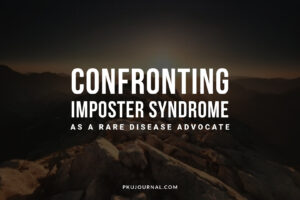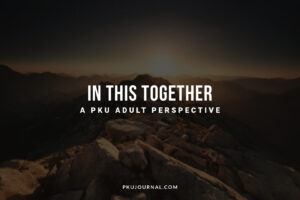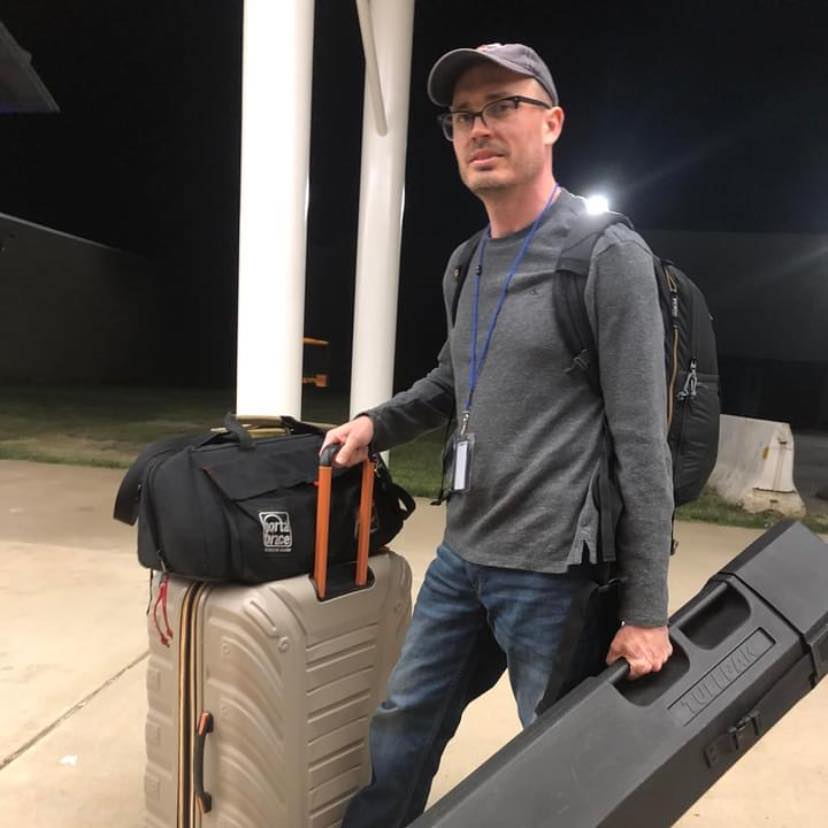What is the newborn screening system? That’s a subject I’ve been thinking about since my previous article, “Newborn Screening is a Human Right”.
There’s been a lot of anxiety and confusion since the termination of the Advisory Committee on Heritable Disorders in Newborns and Children (ACHDNC). I recommend you read this statement from the National Organization for Rare Disorders (NORD) in case you are unfamiliar with this news.
So, let’s take a step back and think about what newborn screening is.
Newborn screening isn’t just a test. It’s a system of interrelated and interconnected moving parts. And US federal policy is weakening that system.
About My Perspective
I’m biased. I admit that.
We all are biased. Every single person. We have a perspective, a view of the world that influences every thought, word, and deed. And my views of life and PKU advocacy are inseparable.
I try to live by this ancient wisdom: “Seek justice. Correct oppression.”
That’s my advocacy battle cry. Ancient words spoken thousands of years ago that I think are relevant in the modern world.
This is my view of advocacy, and it’s really very simple—make a stand for what you think is right to correct what you think is wrong.
And I think newborn screening is the right thing to do.
What is Newborn Screening?
As I said above, it’s not just a test. It’s a system.
Newborn screening has been called one of the greatest public health achievements. That’s from the Centers for Disease Control and Prevention (CDC). You can read more about that statement here.
Yes, it’s a public health program. I am a strong supporter of public health initiatives. Because I’ve met so many people who work in public health who have devoted their lives to advancing newborn screening, as well as other areas of medicine.
But how does newborn screening work?
The following is from my article, “Call Me Bob: A Story About Dr. Robert Guthrie”. It’s part of a Public Service Announcement I produced for the Association of Public Health Laboratories (APHL). APHL has been a great partner in my newborn screening advocacy efforts, and I am proud of the work they do on behalf of newborns across the world.
Public health workers are dedicated professionals. And I stand proudly with them in the cause of saving babies.
The Newborn Screening System – An Overview
Here is some information they shared with me for that Public Service Announcement:
“Each year nearly four million US newborns are screened for a panel of genetic conditions, hearing loss, and critical congenital heart disease or CCHD as part of a process called ‘newborn screening.’ Fourteen thousand of those babies will be identified with a condition that could cause disability or death if not detected and treated early. That’s 14,000 babies whose lives are saved or improved through newborn screening every year. It is one of the fastest, safest ways to help protect your baby against certain medical conditions.
Newborn screening has three components: hearing, CCHD, and blood spot screening. Hearing and CCHD screening are conducted at the hospital before the family is discharged (or at home before the birth attendant leaves), but the blood spot screening is conducted by the state or territorial public health laboratory. A day or two after the baby is born, a few drops of blood are collected from the baby’s heel on a filter paper. It’s a simple and routine procedure. The sample is then sent to the public health laboratory which tests for a panel of genetic conditions that may differ state to state. Those little drops of blood can provide huge amounts of life-altering information in the baby’s first days of life.”
A Public Service
Newborn screening is a public service.
And here is where a core value difference seems to arise in our culture.
Public service is good.
I worked in broadcast journalism in my 20’s. And back then we understood that journalism was a public service. Business has always been part of that world. I mean, you have to make a profit to produce a product. That’s just the way the world works. But there was an understanding that an FCC license came with a responsibility to the public good.
For example, you might get frustrated every time you’re watching broadcast TV and the local news breaks in with a weather report. But let me tell you a brief story about why it’s important.
In January 2005 a tornado touched down overnight outside of El Dorado, Arkansas. We went live from the scene of the destruction the next morning and turned a story for the midday newscast. We interviewed a family who made it out of their house. Well, most of them. A man and his 18-year-old grandson were picked up by the storm as they fled. The 18-year-old man survived. His grandfather didn’t. But the family said more of them would have died, had they not been watching our TV station and seen the weather report.
Local broadcasting is a valuable public service.
We also produced Public Service Announcements (PSA’s). Routinely. And so, that’s what I had mind when I produced this PSA for APHL to appear on my podcast. I am not simply trying to share my personal experiences. I am also trying to share information for the public good.
That idea of public service has, in my view, eroded over the last few decades. But it drives me in my advocacy.
What I’ve been given in life, I want to give freely. That’s the principle behind my newborn screening advocacy. I was screened as a newborn. I was saved. And I want to make sure that every baby born in the world receives newborn screening and has the same chance at life. Because newborn screening is a human right.
More Than Just A Test
Newborn screening is more than just a test.
It’s a life-saving system.
It’s the nurse that gathers the sample on the filter paper.
It’s the administrators who ship the sample to the state laboratory.
It’s the state lab workers who process the sample.
It’s the manufacturers who make the specialized equipment necessary to confirm a diagnosis.
It’s the medical professionals who communicate with the families once a diagnosis has been made.
It’s everything that happens after that. With PKU and other metabolic disorders, it’s the entire system of follow-up and treatment that continues throughout life.
And it’s also the legislative advocates and policy makers who strive to add new rare diseases to federal policy… At least, until recently.
Without the ACHDNC there is currently no path to improving policy or adding new rare diseases to the Recommended Uniform Screening Panel (RUSP). And those improvements are necessary. In 2024, Krabbe disease was added to the RUSP, and that’s a rare disease that can be fatal. But other rare diseases were waiting to be included in the RUSP. And now, there is no path for them.
This just refers to the blood spot screening. I can’t speak to the hearing or CCHD screening, because that’s not my area of advocacy. But it’s just as important.
I can only speak to my experience. And my experience is based on my advocacy journey since 2012, my membership in the International Society of Neonatal Screening, my professional and personal relationships with those who work in the field of newborn screening, and the fact that newborn screening saved my life.
And it saved the lives of a generation.
As we remember newborn screening and the legacy of Dr. Robert Guthrie, don’t ever forget…
One person changed the world because of his choices.
And so can you.
Timely. Accurate. Comprehensive.
Investment in our nation’s newborn screening infrastructure is ethical and wise. It prevents disability and death. And I am a supporter of robust US federal newborn screening policy in general, and the Advisory Committee on Heritable Disorders in Newborns and Children (ACHDNC) in particular.
Those involved in newborn screening advocacy know that the Recommended Uniform Screening Panel (RUSP) is not perfect. The process to be added to the RUSP is very long, and the process is excruciating for families whose children are dying. I first heard of Krabbe disease and their struggle to be included in the RUSP in 2013. It wasn’t added until 2024. For families who are struggling with their own grief, and fighting to make sure more babies don’t die and more families don’t suffer the same grief, that is an eternity.
The newborn screening system as a whole isn’t perfect. But the system needs to be strengthened, not slowly dismantled. And that is happening.
Maybe you disagree with me. That’s your right. I am passionate about my views, but as far as I am concerned, we can disagree respectfully.
But if we disagree, then disagree we must.
The PKU community has supported my work since 2012. People have listened to what I’ve had to say, supported my media projects, invited me to speak, and shared my views across social media. And that support has sent me all over the world.
I have seen the results of a delayed diagnosis with my own eyes.
I have heard the anguish of parents whose children didn’t receive newborn screening, and the guilt in the voice of those who chose against it.
And I have wept at the thought of children who didn’t receive the same chance at life that I did.
That’s not manipulation. That’s the truth.
You are entitled to your views, whatever they may be. I am entitled to my experience, because I know it to be true.
And here’s what I know…
There is much we cannot control about life. But there are some things we can change. And we can create a better future for babies across the world by protecting and improving the newborn screening system.
The following is from my story “Call Me Bob: A Story about Dr. Robert Guthrie”, and I think it’s the best way to end this reflection:
“We can prevent the worst outcomes from undiagnosed Phenylketonuria. Or Maple Syrup Urine Disease. Or Homocystinuria. Or Tyrosinemia. Or many, many others that are on the newborn screening panel (More info here on metabolic disorders in general).
So we fight.
We fight to make sure that newborn screening occurs and a diagnosis confirmed in a timely manner so that a child doesn’t suffer consequences—or die—because of a delayed diagnosis.
We fight to make sure that the results are accurate so that no one slips through cracks in the system.
And we fight so that screening is comprehensive and that more rare diseases are added to newborn screening programs.
Timely. Accurate. Comprehensive. That is the standard.
And so… we fight.
And we will never, never, never give up.”
Written in love, grief, and yet… hope…
~ Kevin Alexander











Leave a Reply